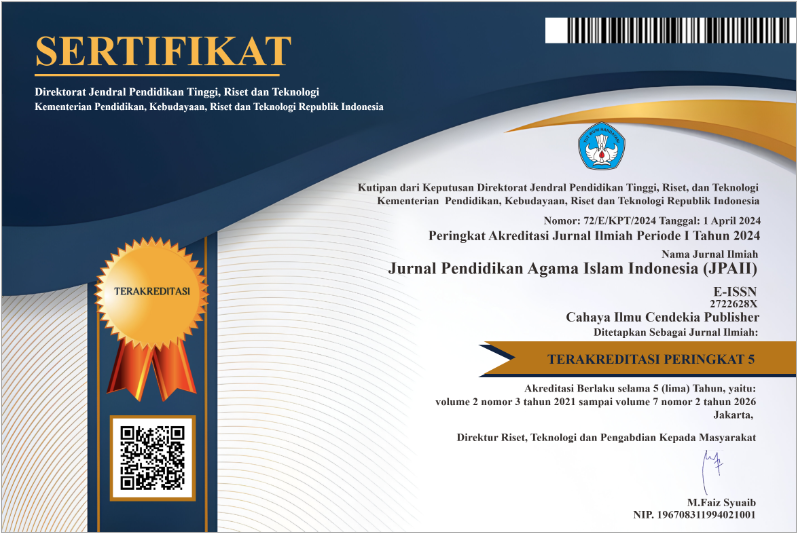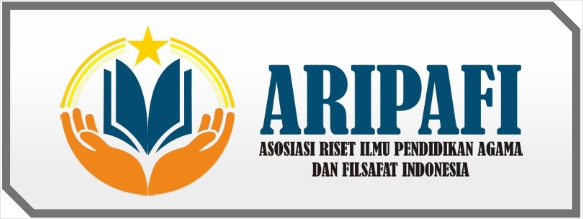The Influence of Monday-Thursday Fasting Intensity on the Patience of Islamic Religious Education Students
Abstract
Purpose of the study: This study aims to reveal whether there is a correlation between the intensity of performing the Monday Thursday sunnah fast and the level of patience of Islamic Religious Education students.
Methodology: The research method uses a quantitative approach. The population of this study was 153 students of Islamic Religious Education. The sample in this study was 40 students. The researcher used a data collection method in the form of a questionnaire. Instrument analysis includes validity and reliability analysis. Then process the data that has been obtained using the product moment formula.
Main Findings: The results of this study indicate that the Intensity of Carrying Out Sunnah Fasting on Mondays and Thursdays is in the good category as indicated by an average value of 77.47. Meanwhile, the Level of Patience of Islamic Religious Education Students is included in the sufficient category as indicated by an average value of 74.45.
Novelty/Originality of this study: This study can reveal how routine spiritual practices have a significant influence in shaping the character of patience among young academics.
References
T. Ouariachi, C.-Y. Li, and W. J. L. Elving, “Gamification approaches for education and engagement on pro-environmental behaviors: Searching for best practices,” Sustainability, vol. 12, no. 11, p. 4565, 2020. doi: 10.3390/su12114565
U. Brand et al., “From planetary to societal boundaries: an argument for collectively defined self-limitation,” Sustain. Sci. Pract. policy, vol. 17, no. 1, pp. 264–291, 2021. doi: 10.1080/15487733.2021.1940754
S. Sorrell, B. Gatersleben, and A. Druckman, “The limits of energy sufficiency: A review of the evidence for rebound effects and negative spillovers from behavioural change,” Energy Res. Soc. Sci., vol. 64, p. 101439, 2020. doi: 10.1016/j.erss.2020.101439
A. W. Gouldner, “The importance of something for nothing,” Mauss Int., vol. 3, no. 1, pp. 63–98, 2023. https://www.cairn-int.info/revue-mauss-international-2023-1-page-63.htm
A. Kuswaya and S. Ma’mun, “Misinterpretation of patience: An analytical study of nerimo concept within Indonesian Muslim society,” Indones. J. Islam Muslim Soc., vol. 10, no. 1, pp. 153–176, 2020. doi: 10.18326/ijims.v10i1.153-176
M. Yanto, “The Values of Patient Education in Surah Ar-Rad verse 22,” Nazhruna J. Pendidik. Islam, vol. 4, no. 3, pp. 792–803, 2021. doi: 10.31538/nzh.v4i3.1767
J. J. Sanguineti, “God in the Face of Natural and Moral Evils: A Thomistic Approach,” Religions, vol. 14, no. 7, p. 816, 2023. doi: 10.3390/rel14070816
A. P. Siregar, A. Ramzar, M. A. Ketaren, and M. F. H. Yahya, “The Role Of Tasawuf In Your Approach To Allah Swt,” Int. J. Islam. Stud. Soc. Sci., vol. 1, no. 1, pp. 1–18, 2024. https://jurnal.asrypersadaquality.com/index.php/ijiss/article/view/362
S. A. Gürbüz, “A key to excellence: patience and patient in the early Sufis,” J. Educ. Gift. Young Sci., vol. 10, no. 1, pp. 1–10, 2022. doi: 10.17478/jegys.1038304
A. S. Mainiyo and M. M. Sule, “Impact of Qur’anic Moral Excellence on the Lives of Muslim Society: An Exposition,” Demak Univers. J. Islam Sharia, vol. 1, no. 03, pp. 188–205, 2023. doi: 10.61455/deujis.v1i03.73
E. H. Othman, I. A. Khalaf, M. R. Alosta, H. Abualruz, and R. Zeilani, “Death and dying through the lens of Jordanian Muslim patients and caregivers,” OMEGA-Journal of Death and Dying, p. 00302228221133505, 2022. doi: 10.1177/00302228221133505
A. Solihin, U. Supriadi, and E. Suresman, “The Concept of Patience in Islam and Its Implications for Education,” TARBAWY Indones. J. Islam. Educ., vol. 9, no. 2, pp. 184–193, 2022. doi: 10.17509/t.v9i2.48771
A. Attinà et al., “Fasting: How to guide,” Nutrients, vol. 13, no. 5, p. 1570, 2021. doi: 10.3390/nu13051570
W. C. Yew, A. H. Awang, S. Selvadurai, M. Mohd Noor, and P. K. Chang, “A comparative study of Islam and buddhism: A multicultural society perspective,” Religions, vol. 12, no. 12, p. 1098, 2021. doi: 10.3390/rel12121098
N. H. Mansor, R. Abdullah, A. M. Nor, and K. H. M. Jodi, “Curbing Promiscuous Sex through the Practice of Fasting: An Islamic Approach,” Afkar J. Akidah Pemikir. Islam, vol. 24, no. 2, pp. 205–240, 2022. doi: 10.22452/afkar.vol24no2.6
S. R. Annisa, A. M. Jannah, M. R. M. Jannah, A. J. R. Semendawai, and A. Maulana, “Ayyamul Bidh Sunnah Fasting To Train Patience Instudents,” in Proceeding Conference on Psychology and Behavioral Sciences, 2024, pp. 507–518. https://proceedings.dokicti.org/index.php/CPBS/article/download/178/167
M. M. Maslahat and L. Z. Khaq, “The Impact of Fasting Mondays and Thursdays on Self-Control of Students at Al-Mustaqim Bugel Islamic Boarding School, Jepara,” in Proceedings of International Conference on Psychology, Mental Health, Religion, and Sprirituality, 2023, pp. 25–33. doi: 10.29080/pmhrs.v1i1.1157
A. Wahid, K. bin Ahmad, J. Assagaf, and H. Amin, “Hermeneutical Analysis Of Hadith Concerning The Necessity Of Having The Husband’s Permission In The Implementation Of Sunnah Fasting For The Wife,” J. Posit. Sch. Psychol., pp. 355–366, 2023. https://mail.journalppw.com/index.php/jpsp/article/view/16341
M. Brambilla, S. Sacchi, P. Rusconi, and G. P. Goodwin, “The primacy of morality in impression development: Theory, research, and future directions,” in Advances in experimental social psychology, vol. 64, Elsevier, 2021, pp. 187–262. doi: 10.1016/bs.aesp.2021.03.001
S. Ridho, A. K. Akbar Maulana, and A. Futihandayani, “The Relations Between Monday and Thursday Fasting Toward Spiritual Intelligence (SI): A Preliminary Report,” Journal of Cardiovascular Disease Research, vol. 12, no. 4, pp. 552-559, 2021. https://jcdronline.org/admin/Uploads/Files/6246b6afd7f069.20898013.pdf
U. Yahya, “The Obedience of Hajj: Problems and Its Implementation and Effort to Achieve Their Compatibility,” J. Adab., vol. 22, no. 2, pp. 273–294, 2022. doi: 10.24252/jad.v22i2a6
G. Nisrina, W. Hidayati, I. Iftitanina, D. F. M. Anwar, and R. Hateem, “Consistency of Fasting Monday-Thursday on Self-Control,” in Proceeding Conference on Psychology and Behavioral Sciences, pp. 273–281, 2024. doi: 10.61994/cpbs.v3i.158
A. Azis, S. Utami, L. Cronin, and A. H. Al Sanie, “The Influence of the School Environment on the Formation of Children’s Character,” J. Basic Educ. Res., vol. 5, no. 1, pp. 16–21, 2024. doi: 10.37251/jber.v5i1.850
M. Fathurahman, “Path Analysis Between Job Satisfaction And Loyalty With Work Environment And Culture As Explanatory Variables,” PRODUKTIF J. Kepegawai. dan Organ., vol. 1, no. 1, pp. 36–43, 2022. doi: 10.37481/jko.v1i1.11
H. Fitriana and A. N. Waswa, “The Influence of a Realistic Mathematics Education Approach on Students’ Mathematical Problem Solving Ability,” Interval Indones. J. Math. Educ., vol. 2, no. 1, pp. 29–35, 2024. doi: 10.37251/ijome.v2i1.979
R. Rafiola, P. Setyosari, C. Radjah, and M. Ramli, “The effect of learning motivation, self-efficacy, and blended learning on students’ achievement in the industrial revolution 4.0,” Int. J. Emerg. Technol. Learn., vol. 15, no. 8, pp. 71–82, 2020. https://www.learntechlib.org/p/217073/
S. M. T. Pandiangan, F. Oktafiana, S. R. Panjaitan, and M. Shifa, “Analysis of public ownership and management ownership on the implementation of the triple bottom line in the plantation sector listed on the Indonesia Stock Exchange,” Budapest Int. Res. Critics Institute-Journal, vol. 5, no. 1, pp. 349–3497, 2022. https://eprints.unm.ac.id/29704/
H. Taherdoost, “Data Collection Methods and Tools for Research; A Step-by-Step Guide to Choose Data Collection Technique for Academic and Business Research Projects,” Int. J. Acad. Res. Manag., vol. 10, no. 1, pp. 10–38, 2021, https://hal.science/hal-03741847
M. K. Alam, “A systematic qualitative case study: questions, data collection, NVivo analysis and saturation,” Qual. Res. Organ. Manag. An Int. J., vol. 16, no. 1, pp. 1–31, 2021, doi: 10.1108/QROM-09-2019-1825.
S. Demir, “Comparison of normality tests in terms of sample sizes under different skewness and Kurtosis coefficients,” Int. J. Assess. Tools Educ., vol. 9, no. 2, pp. 397–409, 2022. doi: 10.21449/ijate.1101295
P. Guzik and B. Więckowska, “Data distribution analysis–a preliminary approach to quantitative data in biomedical research,” J. Med. Sci., vol. 92, no. 2, pp. e869–e869, 2023. doi: 10.20883/medical.e869
B. Ginting and D. Sembiring, “The Effect of Giving Pre-Test and Postest on Learning Outcomes of the AMIK Medicom Student Research Methods,” Enrich. J. Manag., vol. 11, no. 1, Novembe, pp. 50–56, 2020. doi: 10.35335/enrichment.v11i1,%20Novembe.35
Copyright (c) 2024 Syahris Shidiq, Shittu Abdulazeez Balogun, Saeed Namazi Zadegan

This work is licensed under a Creative Commons Attribution 4.0 International License.
Authors who publish with this journal agree to the following terms:
- Authors retain copyright and acknowledge that the Jurnal Pendidikan Agama Islam Indonesia (JPAII) is the first publisher licensed under a Creative Commons Attribution 4.0 International License.
- Authors are able to enter into separate, additional contractual arrangements for the non-exclusive distribution of the journal's published version of the work (e.g., post it to an institutional repository or publish it in a book), with an acknowledgment of its initial publication in this journal.
- Authors are permitted and encouraged to post their work online (e.g., in institutional repositories or on their website) prior to and during the submission process, as it can lead to productive exchanges and earlier and greater citation of published work.







.png)
.png)





















